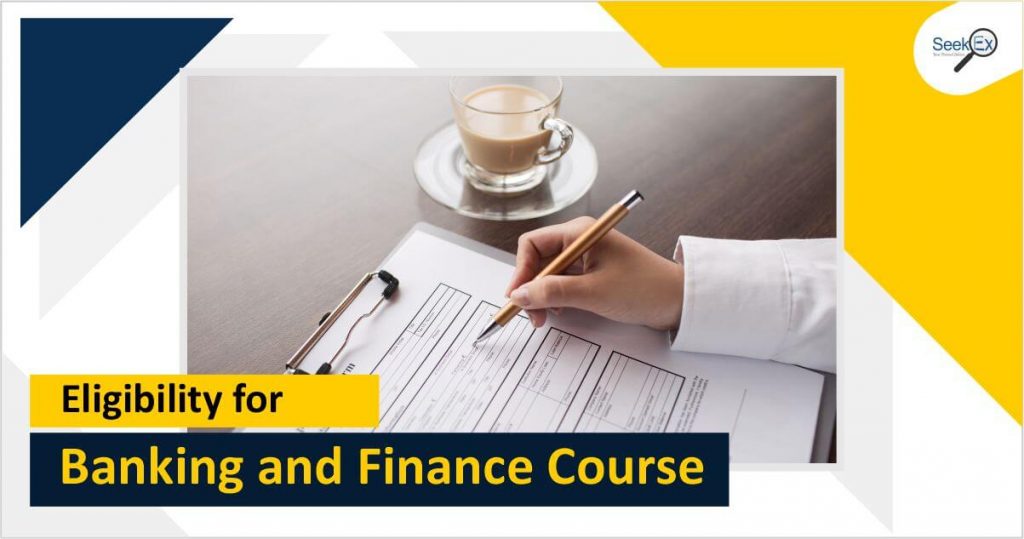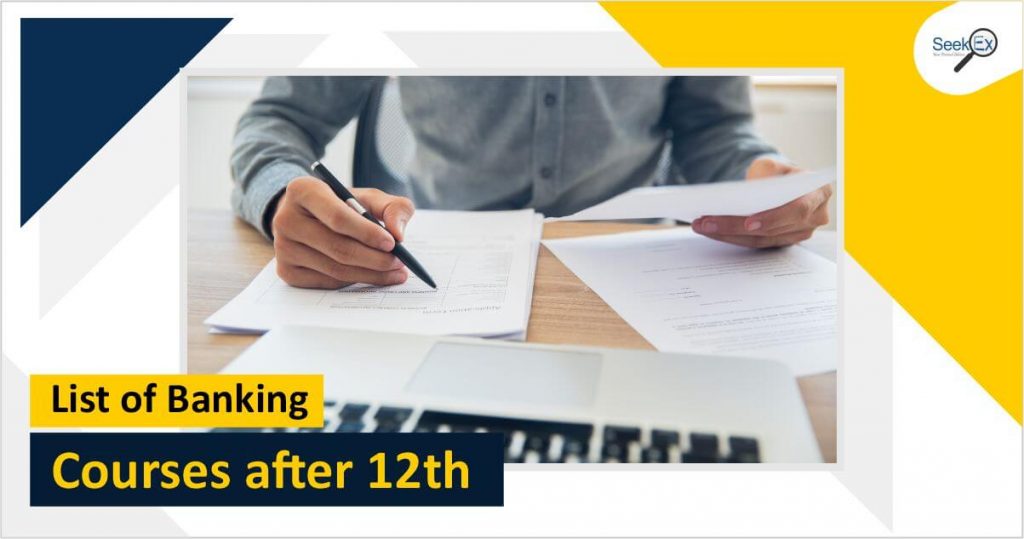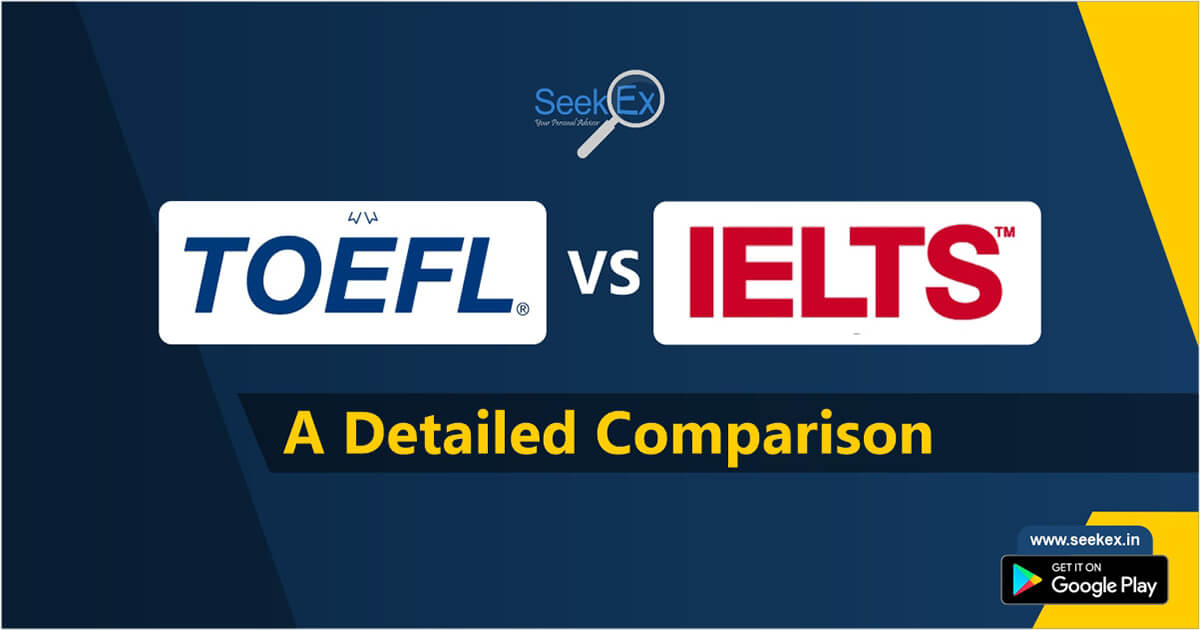Banking Courses After 12th – Courses, Scope, Career, eligibility, and so on
Today, banking is one of the booming sectors with enormous job opportunities. Do you want to grab a job in a bank? Are you aware of the process? This blog brings you all the details about the banking courses after 12th and the process of having a bright career in the banking sector.
Banking is among the most demanding career sectors in this era. Lakhs of students are pursuing banking courses after 12th or graduation or post-graduation for a chance to get into this profession. However, like any other profession banking jobs also come with their own set of pros and cons. Before opting for the courses or appearing for the entrance exams you must know whether you are the best bit for this sector.
The easiest way to determine whether you should opt for the banking profession or not is to consult the career experts on the SeekEx app. The experts will enable you to understand different types of banking courses and also help you to choose the one that will be appropriate for you according to your preferences. Moreover, the banking sector has a high level of competition so career experts also suggest tips to tackle competition easily.
What are Banking Courses?
Contents
- 1 What are Banking Courses?
- 2 Eligibility for Banking and Finance Course
- 3 List of Banking Courses after 12th
- 4 Banking Courses by Banks
- 5 How to get a job in Bank after the 12th?
- 6 How can SeekEx help?
- 7 Conclusion
- 8 Frequently Asked Questions
- 8.1 Can I pursue bachelor’s degree courses in Banking?
- 8.2 What are popular banking examinations?
- 8.3 What are the minimum eligibility criteria to appear for bank exams?
- 8.4 Can science and art students pursue banking courses after 12th?
- 8.5 Does post-graduate banking courses beneficial for banking professionals?

Banking Course is the study of various banking administrations and their services. It enables students to have an overview of the different standards of banking exchanges and services that are provided by a bank. Usually, banking courses after 12th include topics associated with the history of banking, accounting, loans and advances, asset handling, methods, investments, and various other activities. A student also gets to understand the details of the Reserve Bank of India and its functions.
In India, baking and finance are significant parts of the economy. Banks offer various services and products and with each day it is continuously expanding. That’s the reason there is a continuous demand for people to join this sector. Students who have selected banking courses after 12th commerce have lots of scopes to get into this field. The banking courses are available as certificates, diplomas, or undergraduate courses.
Eligibility for Banking and Finance Course

Anyone who is interested in the banking field and has a desire to work in Indian or international banks can opt for either undergraduate, diploma, or certificate banking courses after 12th. Before pursuing the course make sure you fulfill all the below-mentioned eligibility criteria:
- To enroll in any banking course, candidates must complete their class 12 from a recognised board in any stream.
- In most banking courses, it is necessary for candidates to obtain at least 50% marks in class 12.
- Some of the banking courses require the candidates to score at least 60% marks in class 12.
- To get admission in post-graduation banking courses, a candidate must complete their graduation preferably in banking.
- For getting jobs in private or public sector banks in India, candidates must qualify various clerical, PO, and SO entrance examinations.
- Students who want to apply to the banking courses abroad must obtain the minimum required scores in GMAT/SAT/GRE, have a good GPA as well as have qualifying scores in IELTS/TOEFL along with an excellent state of purpose and LOR.
List of Banking Courses after 12th

Undergraduate Degree Courses in Banking
Banking and Finance is one of the vital sectors of any industry. Most of the banking courses are curated in such a way that it offers students specialised knowledge of these fields. Moreover, those students who want to begin their career in the banking sector can easily opt for these undergraduate banking and finance courses. Let’s discuss each one of them briefly:
1.B.com (Finance)
B.com in Finance is an undergraduate degree program that covers fundamental concepts of a traditional B.com course along with specialisation in the banking sector. This is a 3 to 4 years course that deals with subjects like Banking, Finance, and Investments. Those who have completed their class 12th are eligible to apply for this course. It’s not necessary that the candidate should belong to the commerce stream for pursuing this course. Upon completing the course, students usually get the opportunity to work in top positions such as risk and investment experts, financial analysts, and financial advisors.
2. BA in Banking and Finance
Another popular banking course after 12th is BA in Banking and Finance which is a three-year undergraduate degree program. This is a banking course that includes accounting, banking law, insurance law, insurance risk and insurance regulations, and most importantly, concepts of banking. Overall, this course can be considered a disciplinary program that covers an extensive array of subjects and areas of study. Usually, the course fee for BA in Banking and Finance lies between INR15,000 to 30,000 per annum. Once a candidate completes this course they can grab the opportunity to work in Banks, Credit organisations, business schools, consultancies, etc.
3. BA in International Banking and Finance
Anyone who desires to have a career in banking and work in International banks can opt for BA in international banking and finance. Although certificate and diploma courses in international banking are also available, most international banks in India prefer to hire international banking graduates. To be eligible to pursue this course, a candidate must pass 12 grades in any stream. The course covers international banking concepts, fundamentals of international transactions, and a lot more.
4. BBA in Finance and Banking
Apart from BA and Bcom in Finance and Banking, BBA in Finance and Banking is also available. This course is the best choice for those candidates who desire to pursue an MBA in Banking upon completion of their undergraduate degree program. It is a 3-year banking course after 12th that covers the fundamentals and concepts of management. Candidates also gain training in subjects like treasury operations, risk management, investment banking, international banking and finance, project & infrastructure, etc.
5.B.com in Banking and Finance
Bachelor of Commerce in Banking and Finance is a 3-year undergraduate degree program available for students who have completed their 12th in any stream. Basically, banking is a process through which a financial intermediary receives deposits and further channels them through capital markets or directly. Whereas insurance is the organisation that is associated with risk management that provides protection against unclear losses. Hence, after completing this banking course after 12th you can have a successful banking career.
6. Bachelor of Business Finance and Banking
If you are someone who is interested in business as well as banking, then opt for a Bachelor of Business Finance and Banking. The duration of this banking course is 3 to 4 years, depending on the institutes/colleges offering the course. This course will render knowledge about both the subjects and thus it will enhance your chances of employability and develop broad business skills and banking skills of the candidates pursuing it.
Diploma Courses in Banking

Different types of diploma courses are designed in such a way that it focuses on a particular topic. Even a diploma in banking and finance salary is decent enough so candidates can opt for it to have a successful career in this field. Diploma programs in banking are available for students who have at least completed their class 12th. With this course, students gain knowledge about the fundamental concepts of the banking sector. Usually, the duration of such banking courses after 12th is around 6 months to 2 years. Some of the popular diploma/certificate courses in Banking are:
- Diploma in Banking Services Management
- Graduate Diploma in Banking and Finance Law
- Graduate Diploma in Banking
You may like: Forensic science courses after 12th | Career, Courses, eligibility, colleges, and so on
Certificate Banking Courses
Certificate courses are short-term courses that help students to acquire skill-based knowledge and information about several activities in the banking sector. Each certificate course is concerned with a specialisation. Just like a diploma in banking and finance, the certificate course in banking is a course that deals with specific banking and finance topics. Thus, anyone who wants to gain knowledge about any specific field can opt for a certificate course. Let’s check some of the popular certificate banking courses after the 12th:
- An advanced certificate in Commercial Banking
- Certificate in Bank Analysis
- Certificate Course in Banking Management
- Advanced Certificate in Loan management and Banking Laws
- Certificate in Rural Banking
- Certificate in Banking
- Certificate in Rural Banking
Post Graduate Banking Courses

Undergraduate degree programs, diploma courses, and certificate courses will surely enable you to acquire a position in the banking sector. However, if you want to secure a supervised position or you want to grow in the banking industry then you must obtain a master’s degree in this field. In the long run, having a master’s degree will be beneficial to landing senior position job profiles in the banking sector. Hence, you get extensive job opportunities both in private as well as public banks. Let’s check out major post-graduate banking courses:
- MBA in Banking and Insurance: One of the famous post-graduate diploma courses is MBA in Banking and Insurance. This bank course fee is higher than other master’s courses but it provides access to high-paying job opportunities. In this course, candidates learn about the concepts of banking and insurance and also get specialised training on each subject. These subjects include international banking, risk management, investment banking, project, and infrastructure, etc. It is a full-time two-year course consisting of four semesters in which the first two focus on the concepts and the last two focus on specialised subject training.
- MBA in Finance Management: MBA in Financial Management or Finance is a Master’s degree course that is offered by private and public institutes in the country. In this banking course, students learn about analytics, budgeting, monitoring of finances, etc. Hence, you get information about marketing trends, financial industry, and economic trends with this course. To get admission in MBA in Finance Management from a reputed institution you must complete graduation as well as qualify in national or state-level entrance exams.
- M.com in Banking and Insurance: To gain academic excellence after completing a banking course after 12th, students prefer to pursue M.com in Banking and Insurance course. It is a two-year master’s course that is available for candidates who have completed their two-year degree course from a recognised university.
- Master’s Degree in Banking: Pursuing a master’s degree in banking is a course that enables you to get a chance to work in reputed banks in the country. Although acquiring an undergraduate degree would enable you to find a job in this sector, still getting a Master’s degree in banking is an added advantage.
- MBA in Banking and Finance: It is a 2 year MBA course that is offered by various prestigious institutions in India. As per the basic eligibility requirement, the candidates must complete a bachelor’s degree in banking or any equivalent degree with 55% marks. Moreover, online banking courses are available that provide an MBA degree in Banking and Finance.
Banking Courses by Banks

Several Indian banks like ICICI bank, State Bank of India, Yes Bank, and Axis Bank conduct banking courses to render appropriate training to the candidates and help them acquire practical knowledge of working in Banks. Usually, these are certificate courses that candidates can pursue after completing class 12th. However, in some cases, graduation is required for pursuing these courses. The best thing about most of the banking courses offered by the banks is that these are banking courses with placement. Let’s check out some of them:
- Post Graduate Diploma in Retail Banking by Axis Bank: PGDRB is a banking course launched by Axis Bank along with NIIT and Institute of Finance and Insurance training Ltd. The main objective of this program is to build a channel for new banking professionals who can receive comprehensive training and start working for Axis bank upon completion of the course. To secure admission in this course the candidates have to pass an admission test and interview. There is a minimal banking course fee for this. Moreover, you will get the provisional appointment letters from Axis bank to join at the officer level at the time of enrolment itself.
- Post Graduate Program in Branch Banking Services by Yes Bank: Yes Bank is one of the fastest-growing private banks in India. The postgraduate program in branch banking services aims to offer opportunities to fresh graduates who want to work in the banking sector. With this course, candidates can acquire knowledge of banking services, learn managerial and leadership techniques and receive practical training in banking transactions. Usually, this course comes with a placement offer upon completion.
- Trade Finance Program by HDFC Bank: Trade Finance program covers topics related to financing for trade. This course imparts knowledge on both domestic and international trade transactions. Various intermediaries such as banks and financial institutions facilitate trade finance transactions by which various types of trades receive their finance. This banking course after the 12th by HDFC bank enables the students to gain knowledge about this sector and thus grab a job opportunity as soon as it gets completed. It is a 45-day rigorous classroom training that focuses on real-life case studies, and banking simulations to prepare candidates to handle their job responsibilities effectively.
- Probationary Officers Programme Post Graduate Diploma in Banking by ICICI Bank: This is yet another popular banking course after graduation that is offered by ICICI bank for fresh graduates. It is a post-diploma course that covers various banking topics that enables candidates to work in a bank effectively. Besides imparting theoretical knowledge this course also provides on-the-job training on different ICICI bank branches. Upon completion of the course, candidates are hired as probationary officers in ICICI banks.
How to get a job in Bank after the 12th?

Once you complete class 12th, you can start preparing to get a bank job. These days, almost all banks conduct exams in which only graduate candidates are eligible to apply. Whether you want to apply for jobs in private banks or international banks there are a few common steps to follow. Each candidate has to undergo different selection rounds. On the basis of the results of one round, candidates are selected for the next round.
Whereas in the case of public banks recruitment exams along with interviews are conducted. The written exams have several sections on verbal aptitude, quantitative aptitude, logical reasoning, and general knowledge. Usually, students prefer to opt for banking courses after B.com to enhance their chances of landing on better job opportunities. Let’s discuss the types of recruitment banks exams for jobs in public banks:
1. IBPS Exam
IBPS((Institute of Banking Personnel Selection) is an organisation that conducts IBPS exams for recruiting candidates in all public sector banks except the Reserve Bank of India. Different exams are conducted for different job positions. IBPS has become a centralised national exam that enables you to acquire a job in public banks.
Whether you pursue banking courses after 12th or not, you have to qualify in the IBPS exam to get a chance to work in public sector banks. The examinations are conducted in two segments: Prelims and Mains. Only when a candidate is able to qualify for prelims they are eligible to appear for the Main examination. Upon qualifying in the mains the candidates are further called for the interview round. The type of examination includes IBPS PO (Probationary Officer) Exam, IBPS Clerk exam, IBPS RRB (Regional Rural Banks), and IBPS SO (Specialist Officer) Exam.
2. SBI Exam
State Bank of India is one of the prestigious banks in India. SBI conducts several examinations to recruit candidates in different positions to work in SBI as well as other associated banks. Majorly there are three segments of SBI recruitment exams. The first one is prelims followed by Mains and Interview. The vacancies are announced by SBI and associate banks.
Mostly, students prefer these bank exams after 12th commerce. However, any graduate candidate is eligible to apply and appear in these bank exams. The types of exams conducted by SBI include SBI Clerk, SBI PO (Probationary Officer), and SBI SO(Specialist Officer) Examination. The associate banks that come under SBI are State Bank of Saurashtra, State Bank of Bikaner and Jaipur, State Bank of Mysore, State Bank of Indore, State Bank of Hyderabad, and State Bank of Travancore.
3. RBI exam
The Reserve Bank of India is the central bank that conducts several examinations to recruit staff for various positions within RBI. The two types of examinations are RBI Grade A, RBI Assistant, and RBI Grade B examinations. Irrespective of the examinations, all the RBI examinations are considered tougher than the other Bank examinations.
If you have pursued banking courses after 12th then that would be an added advantage. However, the candidate has to undergo different levels of examination even if they have completed a banking course. The eligibility criteria require the candidates to pass their graduation in any stream from a recognised university.
Above mentioned bank exams enable the candidates to secure a job position in a bank. Although the candidates must complete their graduation to appear in these exams, they can start preparing for the bank exams just after completing class 12. Moreover, they can also pursue banking courses after 12th and acquire direct entry to banks.
How can SeekEx help?

Are you someone who wants to have a career in the banking sector? This blog has already discussed all the available courses. You are well aware of the prospects of a banking career. But before starting your career you must remember that in this sector, you need to have lots of patience to succeed. Besides that, you must fit in the eligibility criteria and qualify for certain examinations to get the chance to work in banks. Only with proper career planning, you can easily overcome all the problems and excel in this profession. But how to plan your career roadmap?
That’s where you need SeekEx! The career experts on SeekEx not only help you to determine the right banking course after 12th, but they also help in analyzing and deciding the entire career path. Suppose you are in a dilemma and struggling to find the right course for you then career experts will provide all the details regarding the banking courses and also suggest the one that is in demand these days. This will make you confident to make the right career decisions and have a successful career.
Conclusion
Due to changes in banking and finance businesses in India over the past decade, the demand for individuals to work in this field has increased manifold. In this blog, a complete overview of the banking courses after 12th along with the best job options are discussed. If you want to pursue a course or you want to determine the best way to start your career in the banking and finance sector then get in touch with career experts on the SeekEx app.
What to wait for? Go ahead! Get guidance from the career experts on SeekEx and have a successful career in the Banking sector.
Frequently Asked Questions
Can I pursue bachelor’s degree courses in Banking?
Numerous bachelor’s degree courses are available in Banking like BA in Banking and Finance, B.com in Finance and Banking, and BBA in Finance and Banking. Candidates can pursue these courses after 12th.
What are popular banking examinations?
IBPS, SBI, and RBI exams are the popular banking examinations in India.
What are the minimum eligibility criteria to appear for bank exams?
To appear for bank exams, a candidate needs to complete graduation.
Can science and art students pursue banking courses after 12th?
Yes, Arts and Science along with commerce students are eligible to pursue banking courses after 12th.
Does post-graduate banking courses beneficial for banking professionals?
Post graduate banking courses provide knowledge of specialised subjects. This helps banking professionals to grow in their careers.






Would you like to share your thoughts?